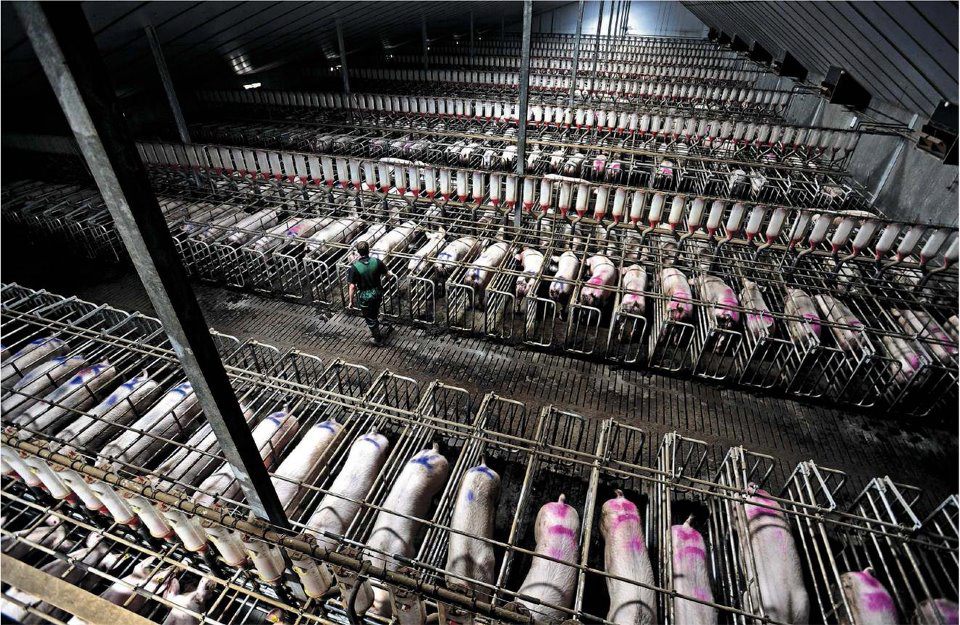Intensive Farming - why is it bad and what can you do to help?
/What is factory farming
Factory farming or intensive farming is the use of highly intensive practices to produce livestock; poultry, pigs and cattle are confined and crammed in huge numbers into tight cages and sheds that more often than not do not have windows or proper ventilation systems, where they are left to eat, sleep, excrete and essentially live. Farms are able to control possibly every factor in these units in order to rear animals to their optimum level; temperature, humidity, food and water intake. Producers say this process is supposedly driven by the demand of cheap food and meat, intensive farming not only meets but facilitates this need providing an end product efficiently and competitively. In the UK alone as of March 2017 there were 1418 permits issued for intensive poultry farms the biggest of which are found in Herefordshire and Shropshire (The Bureau of Investigative Journalism).
Pigs kept in cages only just bigger than their own bodies. (Image source: 8000 hours)
Why is it bad:
No, your perfectly package set of chicken breasts for £4 From the supermarket doesn’t come with warning notes but perhaps it should.
First of all, the conditions in which these animals are subjected to are beyond inhumane, most of these animals haven’t seen the light of day and are so stressed with what is happening to them that they often end up to showing cannibal behaviour. Rest assured, farmers debeak their birds by trimming them or placing them on a hot metal plate to reduce their size (majority of the time without anaesthetic) to make sure the chickens do not hurt themselves or each other as this would mean a farmer loses out on stock and so profits. Farm animals raised for meat “grow three times faster than they would naturally. This is due to selective breeding, growth hormones, and antibiotics in the feed. Chickens reach desired weight in just 35 days.” (Green and Growing)
Factory farming is contaminating the planet as the pesticides and fertilizers used leak into the planets’ soil and water, it also puts a massive strain on natural resources like water, grain and land. Just to put things in perspective, livestock production accounts for around 23% of all water used in agriculture - equivalent to more than 1,150 litres per person per day (WWF). The manufacture of synthetic fertilizers used to grow the crops that feed livestock require vast volumes of valuable resources like phosphorus and nitrogen that can be used elsewhere such as producing crops to feed the world population.
How does it affect you?
The contaminated conditions in which the animals live in allow for diseases to be more easily spread. Diseases such as Salmonella and E.coli fester in the factory farms and this then spreads onto humans through contaminated meat. Waste compounds of factory farms are often dumped and left to rot into enormous brown puddles or sprayed over fields spreading bacteria and damaging substances into the air we breathe and the water we use. “Chemical and infectious compounds from swine and poultry waste are able to migrate into soil and water” (Centers for Disease Control and Prevention), subsequently neighbouring people often fall sick from the improper waste disposal. Bacteria finds the perfect breeding ground in the squalid conditions these animals are forced to live in, to add to that, the animals are so stressed that their immune systems are weakened and so they’re even more prone to these diseases. Farmers have to try and reduce the amount of diseases and infections in these factory farms so animals are overloaded with antibiotics, however there is considerable correlation between factory farming and the rise of antimicrobial resistance (AMR), the name for bacteria that are becoming immune to the drugs that initially would combat them - bacteria being exposed time and time again to antibiotics adapt and evolve resistance to live alongside them. Drug-resistant strains can be passed from direct contact, such as that of a farmer and animal but can also be passed onto humans that consume meat and products like milk from infected animals, lastly it can also be released into the atmosphere through animal waste.
A look inside a poultry farm. (Image Source: ASPCA)
What can be done:
So now you must be asking yourself, what can I do to put an end to this atrocity?
If you can’t give up meat why not try switching to organically farmed animals and organic laid eggs, if your disposable income allows you to. Contrary to popular belief free range eggs are actually not as ‘free’ as we think, “birds raised for meat may be sold as “free-range” if they have government certified access to the outdoors. The door may be open for only five minutes and the farm still qualifies as “free-range.” (United Poultry Concerns)
Reducing your meat intake is a step you’ve heard everywhere before, but instead of turning a full-fledged vegan right away you could gradually decrease your meat consumption over time. This is particularly directed to you if you have an addiction to bacon! ‘Meat-free Mondays’ is global movement where a person will give up meat for a whole day. For one day a week you can explore amazing different meat-free foods, of which recipes are widely available online. Of course, for those who feel more strongly and believe that they could take the plunge, there is always the route of becoming vegetarian or vegan. Eating a balanced vegetarian or plant-based diet can bring many health benefits such as lower blood pressure, lower cholesterol, better blood sugar levels- all while making sure animals aren’t being treated cruelly.
If you can’t bare to part with meat that’s been factory farmed at all but still feel a bit guilty, there are countless of petitions online to either stop factory farming or improve farm animal welfare. Lots of these campaigns can be found online, more specifically on the website Change.org.
If you would like to invest in ISA’s and pensions in a more responsible way, please contact us – we’d be happy to help!
Young cows growing on a factory farm. (Source: Animal Equality/PA)
Here are some more scary facts about factory farming!
There are almost 800 US-style “mega-farms” in the UK. (Source: The Bureau of Around 70% of farm animals in the UK are kept in factory farms. (Source: CIWF, Compassion in World Farming
Chickens in battery cages (metal mesh cages, housing system for animals, primarily egg-laying hens) have to live their whole lives in a space no larger than an iPad. (Source: CIW)
While cows can live naturally to about twenty years old, many dairy cows living in factory farms are sent to slaughter before they reach the age of five. Though cows can naturally remain productive for 12-15 years, the intensive conditions of industrial dairies can take a toll on their health. (Source: Huffington Post)




